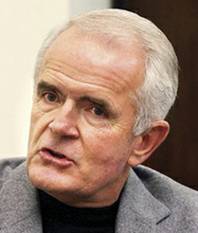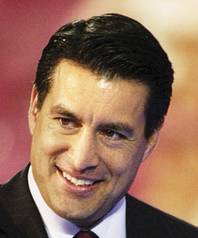Thursday, Jan. 7, 2010 | 2 a.m.
Reader poll
In today's Sun
Sun archives
Sun coverage

Gov. Jim Gibbons

Rory Reid

Brian Sandoval
Democrats and Republicans agreed that the chances of success for many of the ambitious education proposals floated Wednesday by Gov. Jim Gibbons range from slim all the way to none. But that wasn’t necessarily the point.
Gibbons’ plan — which reads like the wish list of a conservative education reformer — appears aimed at exciting the conservative Republican base, while offering a way to cut the state budget.
It certainly has put his political opponents on the defensive.
The governor’s proposal, which he presented to legislators Wednesday in Las Vegas, would eliminate funding for class-size reduction and all-day kindergarten. Some of that money, although not all, would be returned to school districts, his staff said. The proposal would also add a statewide voucher program, which parents could use to pay for private schools.
Gibbons proposed eliminating collective bargaining rights for teachers and other local government employees, such as cops and firefighters.
The plan hits several favored conservative targets — the teachers union, state bureaucracy and its mandates — and emphasizes local school board control.
“Gibbons is taking on K-12 education, particularly the union, which is very popular with the Republican base,” said Eric Herzik, a UNR political science professor.
He added: “I can’t believe he expects this to pass. He knows that the Assembly, in particular, will dig in its heels and say no.”
But in a meeting with legislators, which was closed to the media, he said he would call “as many special sessions as necessary to get this passed,” according to Assemblywoman Debbie Smith, D-Reno. “He was pretty riled up.”
Smith’s account was confirmed by another participant.
Besides not agreeing with his proposals, Smith wondered about the wisdom of enacting such change in a special session, where the Legislature usually meets for only a day or two.
After the meeting, Gibbons sounded conciliatory. “We’re coming up with our proposals, our ideas. They are not the complete answer. Some of them may be totally unacceptable to legislators, but at least we’re coming up with ideas ... We’re asking them to bring their ideas, their suggestions to the table for review.”
Gibbons said his proposals would cut from $30 million to $100 million from the education budget.
Gibbons reached out to a handful of school superintendents before Wednesday’s meeting, according to his staff.
He did not apparently reach out to the Republican legislative leaders who would be needed if the proposals are to have any hope of becoming law during a special session. Senior Republican Sens. Bill Raggio and Randolph Townsend, and Assembly Minority Leader Heidi Gansert said they had not been briefed.
“This would be a difficult agenda to push through a Legislature controlled by Democrats,” Raggio said.
He dismissed the idea that the state could do away with collective bargaining altogether, and pointed out Gibbons’ history as sponsoring the “Education First” initiative. “This is a departure from that.”
Not surprisingly, Democrats were critical of the proposals and accused the governor of playing politics.
“He’s trying to shore up his dismal approval rating with his base,” Assembly Majority Leader John Oceguera said. “These cuts will do more to hurt the economy than help in the long run. It hurts schools, hurts students and ... hurts our economy.”
Some ideas are untenable, particularly in a special session, he said. For example, some recently built classrooms are smaller to accommodate lower student-to-teacher ratios, and can’t fit more kids.
Clark County Commission Chairman Rory Reid, a Democrat running for governor against Gibbons, said, “If the governor really cared about education, he would’ve talked about it during the two sessions when he was supposedly leader of the state. It’s unfortunate that he waits until his back is against the wall and his own political future is at stake to put out an education plan.”
Sen. Joyce Woodhouse, chairwoman of the interim committee on education, said legislators in Wednesday’s meeting were surprised by Gibbons’ proposals.
“I’m surprised at how far-reaching they are,” she said. “Many of these issues have been hard fought and won over the years. We’ve always believed they were good for the education of our children.”
But Oceguera, Reid and Woodhouse won’t be voting in June’s gubernatorial primary.
In that race, Gibbons’ most formidable opponent will be Brian Sandoval, the charismatic former judge who is ahead of Gibbons in polls and is expected to have far more money to run a campaign.
Gibbons’ proposal almost obligates Sandoval to take a position.
Sandoval is walking a tight line, trying to show his conservative bona fides to beat Gibbons and former North Las Vegas Mayor Mike Montandon in the Republican primary while keeping an eye on the general election when he will need to appeal to moderates.
Sandoval last week told the Las Vegas Sun that Gibbons’ budget approach was “prudent.” He was unavailable for comment Wednesday, according to his campaign. Instead, in a statement released by his campaign, Sandoval said, “While I’m an advocate of school choice, expanding empowerment schools and increased parental involvement, I believe it is an extremely bad idea to be laying off hundreds of teachers in a time of record unemployment in Nevada.”
But others had nothing but praise for Gibbons’ plan. The conservative Nevada Policy Research Institute called it a “win-win” for Nevada and a “day of hope for Nevada’s children thanks to the governor’s proposed education reform.”
Conservative consultant Chuck Muth wrote in his analysis of Gibbons’ proposal: “This is exactly the sort of thing which might, just might, put Gov. Jim Gibbons back in the running for the Republican nomination and re-election next fall.”
Indeed, Wednesday’s announcement, with its talk of dismantling the elected State Board of Education and crushing unions is a reminder of a touchstone moment in the conservative movement, during the Ronald Reagan era.
Reagan ran for president in 1980, promising to abolish the U.S. Education Department. Conservatives still look back fondly on the ire of labor supporters after Reagan fired air traffic controllers when they went on strike in 1981.
The push to end collective bargaining for public employees, which would essentially crush the unions, echoes Reagan’s dramatic move, which is widely viewed as the beginning of a sharply anti-labor turn in American governance.
Still, Gibbons has to watch out for a backlash.
Alison Turner, president of the Nevada Parent Teacher Association, said full-day kindergarten and class-size reductions were proven strategies to improve education.
“It will be crippling to the state, taxpayers and kids,” Turner said. “Businesses moving here require a first-class education system.”
Indeed, Gibbons might be taking on relatively popular punching bags, like the union and state bureaucracy.
If it hits citizens in a personal, tangible way — your child’s class size gets bigger and the respected teacher you know gets laid off — anger will mount. And teachers are still considered a popular group.
“If the rank-and-file teachers get riled up, if they can separate themselves from being the ‘union,’ Gibbons has picked a fight with a large and powerful group,” Herzik said.
Sun reporters Cy Ryan and J. Patrick Coolican contributed to this story.
David McGrath Schwartz can be reached at 775-687-4597 or at [email protected]. Michael J. Mishak can be reached at 259-2347 or at [email protected].

Join the Discussion:
Check this out for a full explanation of our conversion to the LiveFyre commenting system and instructions on how to sign up for an account.
Full comments policy